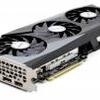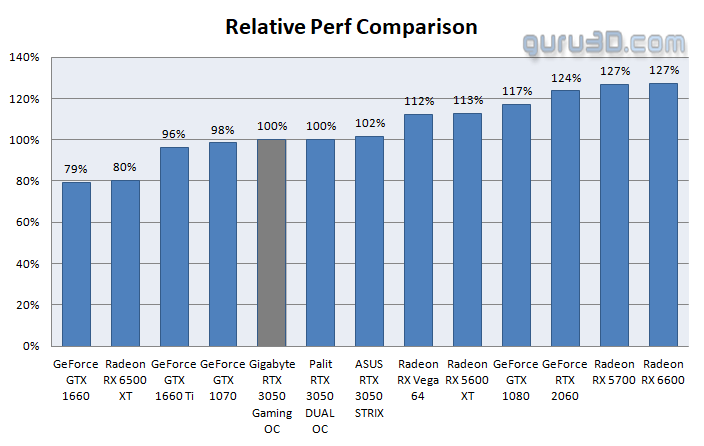Final words and conclusion
Final words
A new AMD graphics card was introduced last week, however, AMD made some key decisions for that series that turned out to be misguided. With this week's debut of the GeForce RTX 3050, you'll get a product with double the graphics memory bus and twice as many GB of GDDR6 memory. There's twice as much data transfer capacity (bandwidth), and 2x times as many shaders, and then Raytracing combined with DLSS because this card has Tensor cores. NVIDIA pounces on the 6500 XT with the debut of the 3050 in that regard. An issue arises, though, because board partners will want to promote the more expensive designs, we'll soon reach prices of $300 or more. Component shortages and cryptocurrency are fueling demand for home PC gaming in the real world, with both miners and gamers snatching up any GPU they can get their hands on. It's a ridiculous mix of supply shortages and price rises.The GeForce RTX 3050 series is a complete win compared to the competitor though. If the price is correct, we'd be pleased to endorse the card series, but we wouldn't recommend spending more than $300 and certainly not $400.
From a performance positioning, the 3050 will hover at GTX 1660 TI / GTX 1070 and Vega 64 / 5600 XT performance. The card series is much faster than AMD's Radeon 6500 XT plus you get the added benefit of 8GB GDDR6 memory at a much wider bus. The 6500 XT will cave in performance quickly once its 4GB VRAM runs out. Far Cry 6 you can enable the HD texture pack as an example, and still have enough graphics memory to run the game properly at the highest image quality settings. So it's a no-brainer really. Gaming with hybrid raytracing is still possible at Full HD, albeit at this level you'll quickly run into performance issues. The lifesaver here is DLSS, once you combine the two technologies you'll still be able to game properly in Full HD.
Cooling & acoustic levels
You've seen the FLIR images; the card is hardly even lighting up, nothing to be concerned about at this point. Temperatures under stress load are around sub-65 degrees Celsius, which is excellent. Acoustics; you can hardly hear the card, but only at regular levels of intense gaming. There are significantly more competing products available on this front than there are on the previous one when it comes to acoustics but at ~38 DBa, you're there already.
Energy
More recently, we changed the way we measure power consumption to bring you more precise numbers. Pulling manufacturer registers with 3rd party software creates the problem that you never know precisely what you are measuring. Then there's the TGP versus TDP versus TBP. With our new methodology, we accurately measure the graphics card's power feeds, that's the PCIe PEG connectors and PCI-Slot. As such, we display the total board power. I mean, you can measure the GPU solely (TGP), but you also need to feed other components, like Memory, ICs, and let's not forget cooling and RGB. This card reveals a typical gaming power draw of roughly 130 Watt (typical).
Coil whine
The card exhibits only insignificant amounts of coil squeal, very little, and it's hard to hear. In a closed chassis, that noise would fade away in the background. Graphics cards all make this in some form, especially at high framerates; this can be perceived.
Pricing
The generic MSRP of the GeForce RTX 3050 sits at the 249 USD marker. Albeit we are still awaiting the MSRP; this card likely is to costs 289,- The market however is complicated with shortages and retailers dictating final pricing, there's little else we can say here. Our advice is to not overspend money on an x050 generation card.
Tweaking
It is possible to manually push the card beyond its factory clock frequencies. Memory speeds of 16 to 16.5 Gbps are achievable, with Boost speeds of 100+ MHz or more, and for the lucky few, even a notch higher (this is on top of the factory optimization). Unfortunately, the power limiter is locked. Increased power budget typically enables the GPU to perform what it does best: accelerate the process of rendering images. When combined with the changes mentioned on the OC page, you should be able to achieve a boost frequency in the range of ~2100 MHz. It prefers more air to breathe since the 3050's memory bandwidth is limited by the 128-bit wide memory bus on which it operates. With the 1.60 Gbps (effective data rate) optimization, we were able to implement, you will notice a significant increase in performance. When used in conjunction with that dynamic turbo in the ~2100 MHz range. Keep in mind that values vary depending on the workload and, consequently, the game title. Remember that in order for our change to be considered real, it must pass four games in a full benchmark run at WQHD in order to be considered reliable.
Conclusion
To put it in simple terms, the GeForce RTX 3050 delivers. While this may be a budget graphics card, NVIDIA did configure it properly. And this, in particular, translates into quite respectable levels of performance. The correct choice was 8GB gDDR6 graphics RAM with a respectable memory bus. It makes gaming in Full HD absolutely great and even at WQHD, most games should run fine. The fun thing is that Raytracing performance at Full HD is within reach as well once you enable DLSS. That level of performance for GeForce RTX x050 series graphics card does make it tick all the right boxes if you ask us. While we don't care about raytraced shadows at all, it's the clarity of the raytraced reflections that make the difference for us. Drive through London in Watch Dogs: Legion or looking at water and fire reflections in Battlefield; these are the types of things that create a noticeable difference. In order to get the most out of it, you'll get DLSS in your video games as well (if supported). Certainly, the card is not a powerhouse, but it is very capable of allowing you to frag along at respectable framerates. If prices are kept in line, The Palit DUAL OC edition GeForce RTX 3050 is perhaps a good match for you if you need Full HD performance, with WQHD capability. The Gigabyte card remains reasonably silent and is cooled enough, as well it's a decent-looking product (but the design is overdue for a revamp though). With the games that support DLSS you'll reap the benefits of even more performance. So yeah, a decent card, and if prices remain in line, even recommended.
Download NVIDIA GeForce drivers
Sign up to receive a notification when we publish a new article.
Or go back to Guru3D's front page
- Hilbert, LOAD"*",8,1.



